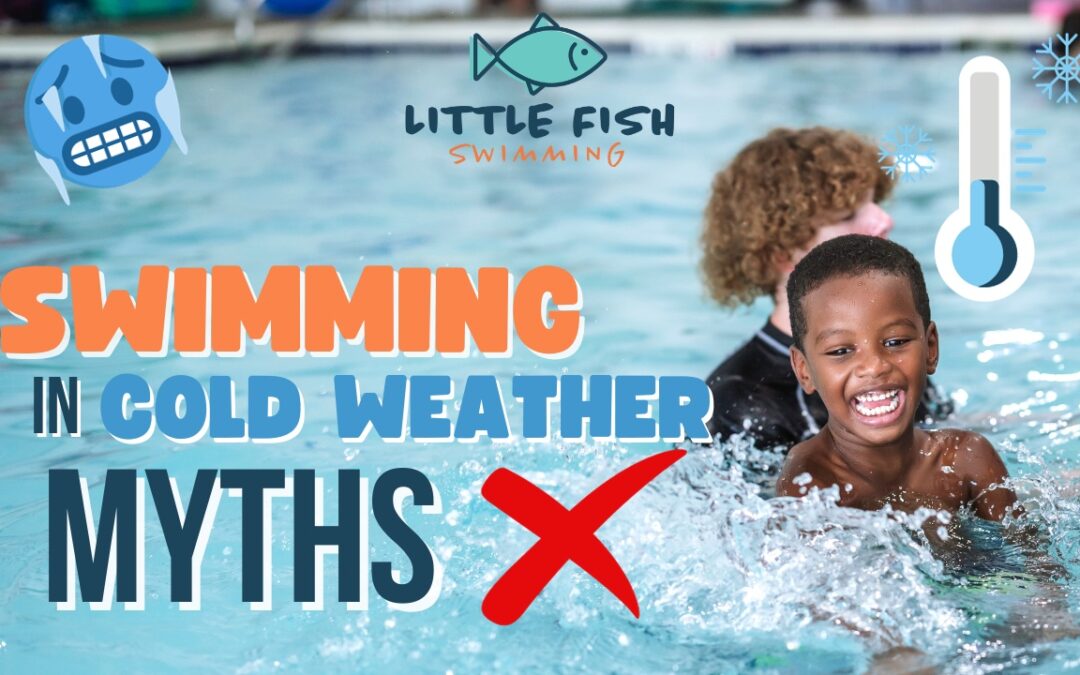As the days grow shorter and the air turns chilly 🥶, the idea of swimming in cold weather might seem unappealing or even concerning for many. However, there are numerous misconceptions about swimming during the colder months that need to be addressed! Let’s debunk five common myths about swimming in cold weather, so you can enjoy the benefits of year-round swimming without hesitation! ⬇️⬇️⬇️
MYTH 1: I’LL CATCH A COLD IF I GO OUTSIDE WITH WET HAIR 🤧
This myth has been around for generations, but it’s time to set the record straight: going outside with wet hair does not cause you to catch a cold. Colds are caused by viruses 🦠, not by being cold or damp. While it’s true that being exposed to cold weather might lower your immunity temporarily, it’s not the wet hair that’s to blame! Just be sure to dress warmly when you’re done swimming to avoid feeling uncomfortably cold🧣.
MYTH 2: YOU ONLY NEED TO KNOW HOW TO SWIM IN SUMMER ☀️
Swimming isn’t just a summer activity ☀️. Learning to swim is a valuable life skill that is beneficial year-round. Water safety is essential in all seasons, and children should be equipped with the knowledge and skills to swim safely, regardless of the weather 😎. Enrolling your child in swim lessons during the colder months can provide them with a valuable opportunity to develop their skills, which can be especially useful for emergency situations!
MYTH 3: SWIMMING IS ONLY A SUMMER SPORT ☀️
Swimming isn’t limited to the summer season 👎🏻. Many swimming pools are open year-round, and indoor facilities allow for swimming in a controlled and comfortable environment, even during the coldest winter months ❄️. Competitive swimmers train year-round, often indoors, and enjoy the benefits of improved physical fitness, cardiovascular health, and stress relief all year.
MYTH 4: SWIMMING IN THE WINTER CAUSES EAR INFECTIONS👂🏼
Contrary to popular belief, swimming in cold water during the winter months doesn’t directly cause ear infections 🚫. Ear infections are typically the result of water getting trapped in the ear canal, which can happen in any season if you don’t properly dry your ears after swimming. Using earplugs and keeping your ears dry can help prevent ear infections, no matter the temperature of the water.
MYTH 5: I WILL JUST REMEMBER WHAT I LEARNED LAST SUMMER 🏊🏽♂️
Swimming skills are not like riding a bicycle 🚴🏻♀️; they can fade if not consistently practiced. During the winter months, swimmers may experience some loss of technique or endurance 🏊🏽♂️. To maintain and improve their skills, regular practice is essential. Off-season swimming helps swimmers stay in shape, refine their techniques, and be ready to jump back into the water at their best when warmer weather arrives.
In conclusion, swimming in cold weather should not be underestimated due to these common myths🚫. Debunking these misconceptions can help you embrace swimming as a year-round activity that offers numerous physical and mental benefits 🙌🏼. Remember that wet hair doesn’t cause colds, swimming is a valuable skill for all seasons, pools are open year-round, ear infections are preventable with proper care, and swimming skills need ongoing practice! So, whether you’re a parent or an avid swimmer, don’t let these myths discourage you from enjoying the water all year long! 😀
Want to work on your swim skills? Sign up today! www.littlefishswimming.com/swim-lessons/

